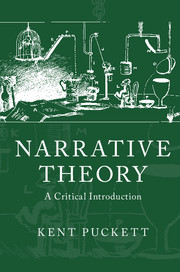Book contents
- Frontmatter
- Contents
- Acknowledgments
- Chapter 1 Introduction: Story/Discourse
- Chapter 2 Action, Event, Conflict: The Uses of Narrative in Aristotle and Hegel
- Chapter 3 Lost Illusions: Narrative in Marx, Nietzsche, and Freud
- Chapter 4 Epic, Novel, Narrative Theory: Henry James, Georg Lukács, Mikhail Bakhtin, and Erich Auerbach
- Chapter 5 Form, Structure, Narrative: Propp, Shklovsky, Saussure, Lévi-Strauss
- Chapter 6 Narratology and Narrative Theory: Kristeva, Barthes, and Genette
- Bibliography
- Notes
- Suggested Further Reading
- Index
Chapter 6 - Narratology and Narrative Theory: Kristeva, Barthes, and Genette
Published online by Cambridge University Press: 01 December 2016
- Frontmatter
- Contents
- Acknowledgments
- Chapter 1 Introduction: Story/Discourse
- Chapter 2 Action, Event, Conflict: The Uses of Narrative in Aristotle and Hegel
- Chapter 3 Lost Illusions: Narrative in Marx, Nietzsche, and Freud
- Chapter 4 Epic, Novel, Narrative Theory: Henry James, Georg Lukács, Mikhail Bakhtin, and Erich Auerbach
- Chapter 5 Form, Structure, Narrative: Propp, Shklovsky, Saussure, Lévi-Strauss
- Chapter 6 Narratology and Narrative Theory: Kristeva, Barthes, and Genette
- Bibliography
- Notes
- Suggested Further Reading
- Index
Summary
Eternity is in love with the productions of time.
William Blake, The Marriage of Heaven and HellAs we begin at last to approach our end, we end up, as it were, back at the beginning of what is usually understood as narrative theory. While I have, in other words, been looking closely at some of the movements, individuals, and ideas that together form what I have been calling a prehistory of narrative theory, our turn now to Julia Kristeva, Roland Barthes, Gérard Genette, and the consolidation of these ideas in the form of structuralist narratology takes us to the point where most accounts of narrative theory rightly begin. Indeed, as I said in the Introduction, although the story–discourse relation is one that we can trace conceptually from Aristotle to the Russian Formalists and beyond, the terms derive their current disciplinary force from a moment in the late 1960s and early 1970s when a combination of intellectual and political conditions – particularly in France – made not only possible but also seemingly necessary a narrative theory that could draw at once on structuralist linguistics, Russian Formalist poetics, and critical theories derived from Marx, Nietzsche, and Freud. As I will suggest, it is with the appearance of Kristeva's, Barthes's, and Genette's major works (along with a number of others that I will mention along the way) that narrative theory begins to take its current institutional shape and to be defined in terms of controversies, problems, questions, and developments internal to it as a discipline.
Where, however, their place as founders of contemporary narrative theory is obvious and secure, what is less visible is their own vital and contested relation to the messy and exciting intellectual context I have been working to sketch out over the course of this book.
- Type
- Chapter
- Information
- Narrative TheoryA Critical Introduction, pp. 223 - 289Publisher: Cambridge University PressPrint publication year: 2016



